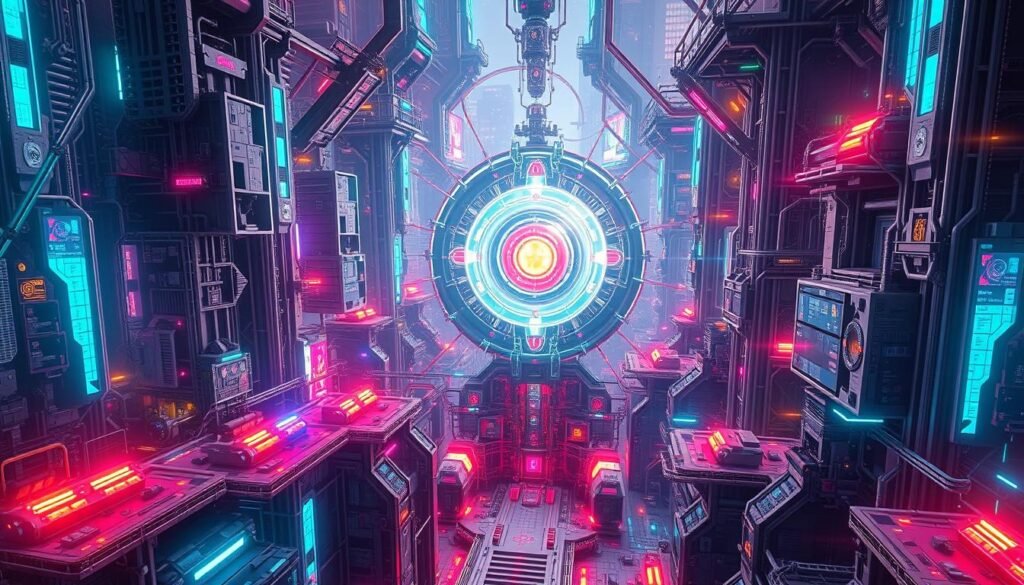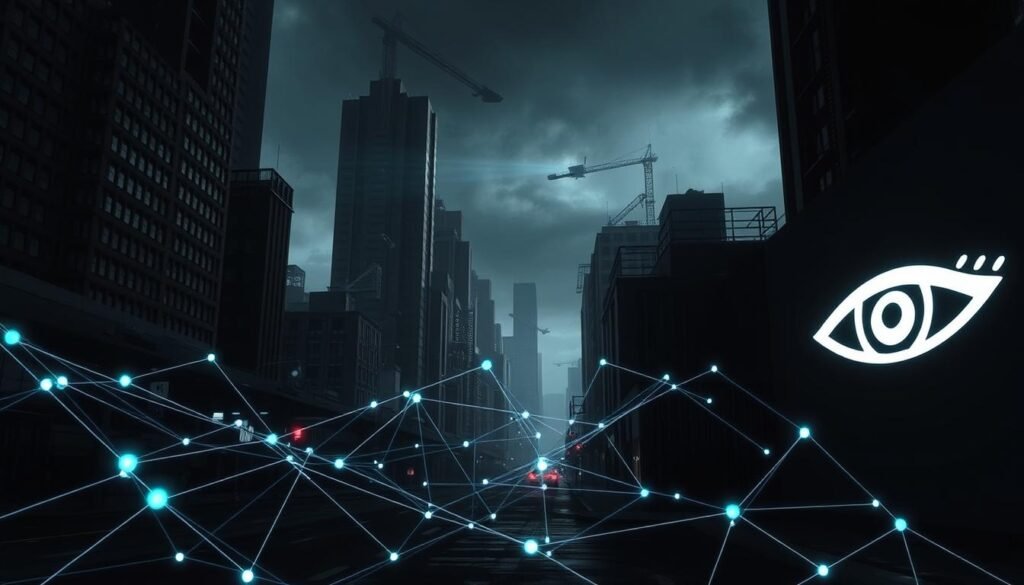A poll by YouGov found nearly half of Americans worry AI might harm us. This shows a big concern about AI’s growing power. With tools like ChatGPT and Gemini getting better, many wonder if AI will take over.
Groups like Full Fact use AI to check facts in real-time. This shows AI is good at certain things. But, AI is still not as smart as humans in many areas.
Some think we’ll have AI as smart as humans in a few decades. Others doubt it will ever happen. There are also worries about AI in the military and how it might change jobs.
But AI also offers great chances. It could change many industries and solve big problems. So, most see AI as a tool to help us, not replace us.
In this article, we look at what AI can and can’t do. We talk about why we need to watch it closely. We also see the good and bad sides of AI. This helps us understand AI’s future and how it might change our world.
Key Takeaways
- AI excels in specific tasks but lacks human-level intelligence.
- Human oversight through safety protocols and regulations is crucial.
- Risks include misuse, job displacement, and unintended consequences.
- Opportunities for AI include industry revolution and enhanced productivity.
- Experts have mixed views on the timeline for achieving AGI.
Current Capabilities of AI
Today’s artificial intelligence is very good at doing certain tasks fast. It uses machine learning and neural networks to understand lots of data. This helps it solve problems quicker than people in some areas.
Task-Specific Excellence
AI systems like OpenAI’s ChatGPT and Google’s Gemini do amazing things. In building, AI makes things better, safer, and greener. Experts say 42 percent of big companies use AI, and 40 percent are thinking about it.
Also, 38 percent of companies already use generative AI. Another 42 percent are thinking about it.
| Industry | Impact |
|---|---|
| Construction | Optimized processes, improved safety protocols, sustainable practices |
| Manufacturing | Increased automation, efficiency in production |
| Healthcare | Data analysis for diagnostics, personalized treatment plans |
| Finance | Fraud detection, predictive analysis |
| Education | Personalized learning, administrative task automation |
| Media | Content creation, audience analysis |
| Customer Service | Chatbots, customer query resolution |
| Transportation | Autonomous vehicles, traffic management |
Human-Level Intelligence Gap
AI is getting better fast, but it’s not as smart as humans yet. Experts say AI can be biased because of bad data. Eugenia Rho warns that too much AI can make us think less.
AI can’t feel emotions, know itself, or be creative like humans. It’s hard for AI to solve new problems and make good choices.
A Forbes survey shows people still trust humans more than AI. AI is great at some tasks, but it can’t do everything humans can. Walid Saad says AI is key for smart cities and fast data work.
Limitations of Artificial Intelligence
Artificial Intelligence has made big steps in many areas. But, it still has big limits. It can’t work on its own and needs people to watch over it. It also can’t feel emotions, be truly creative, or work without human-made rules.
Lack of Emotions and Creativity
AI can’t really feel or show emotions like we do. It can act like it’s feeling things to talk better, but it’s not real. This makes AI not good for jobs that need feeling or understanding people’s feelings, like helping with mental health.
Also, AI can’t be creative like humans. It’s good at finding patterns but can’t make new ideas. This stops AI from being useful in creative fields.
Dependent on Human Programming
AI needs people to tell it what to do and how to think. It can only do what humans program it to do. This means AI can pick up on biases from the data it’s trained on.
For example, if AI is trained on data mostly about men, it might choose men more often. This can make hiring unfair. AI also has trouble understanding things like sarcasm or jokes, which makes it not so good at talking like people.
| AI Limitation | Impact |
|---|---|
| Emotional Inability | Reduces effectiveness in empathy-required roles |
| Lack of Creativity | Restricts applications in art and innovation |
| Bias in Decision-Making | Leads to unfair outcomes in hiring, lending, and more |
| Language Processing Shortcomings | Struggles with sarcasm, idioms, and common sense |
Even with these limits, AI is still getting better. Scientists are working hard to make AI feel more, be more creative, and make fairer choices. This is key for AI’s future.
Human Oversight in AI Development
Human oversight is key for safe AI development and AI ethics. It means setting up strict safety rules and ethical checks. This stops misuse and makes sure AI helps us.
Safety Protocols and Regulations
Safe AI needs strict rules and laws. Ethical review boards check AI for biases and ethics. Laws like the European Union’s AI Act make sure humans can watch over AI.
Being open about how AI works is also important. The U.S. wants humans to watch over AI in areas like healthcare. Both the U.S. and the European Union say we need to watch AI closely, depending on how it’s used.
Human oversight keeps AI fair and builds trust in technology.
Ethical Design Considerations
It’s important to mix AI with human input to keep ethics. The Ethics Guidelines for Trustworthy AI list seven key points, like human oversight and technical safety. This mix keeps AI good for society.
Watching over AI from start to end helps catch and fix biases. Working with many people makes AI fairer. The European Union and the U.S. say it’s crucial to train overseers well.
Keeping an eye on AI is an ongoing job. Systems like HITL and HOTL help with different levels of oversight. This keeps AI smart and right.
| Region | Key Regulation | Focus Area |
|---|---|---|
| European Union | AI Act | Human oversight, Transparency, Ethical alignment |
| United States | Executive Orders & Blueprint for an AI Bill of Rights | Human oversight, Healthcare, Bias mitigation |
Setting clear rules and talking to the public is vital for good AI. With the right human oversight, AI can help us in a safe and fair way.
Risks of AI Takeover
The risks of AI takeover include big issues. These are the misuse of AI, job displacement by AI, and unintended consequences from AI systems.
Misuse of AI
The misuse of AI worries experts a lot. AI can break privacy rights and increase surveillance. It can also lead to manipulative practices.
AI can handle a lot of personal data. This raises privacy concerns. Social manipulation with AI is also growing. For example, TikTok is used by politicians to push certain views.
Job Displacement
Job displacement by AI is a big worry. By 2030, AI could replace 30% of work hours in the U.S. in many fields. This includes marketing, manufacturing, and healthcare.
McKinsey says Black and Hispanic workers are at high risk. Goldman Sachs thinks AI could replace 300 million jobs worldwide. But, AI might also create 97 million new jobs by 2025.
However, many current workers might not have the right skills for these new jobs. Jobs like corporate attorneys and accountants could be in danger.
Unintended Consequences
The unintended consequences of AI are also a concern. AI bias can make decisions based on gender, race, or algorithms. This can lead to unfair outcomes.
AI systems are not always transparent. This makes it hard to know if decisions are fair. AI can also spread false information, which can harm society and trust in news.
As AI gets better, it could replace up to 85 million jobs worldwide by 2025. This could make jobs less secure and increase inequality.
Here’s a table with data on the risks of AI takeover in different areas:
| Aspect | Statistics | Impact |
|---|---|---|
| Automation by 2030 | 30% of hours worked in the U.S. economy | Marketing, Manufacturing, Healthcare |
| Job Loss Prediction | 300 million full-time jobs | Global workforce reduction |
| New Jobs by 2025 | 97 million | Emerging skills needed |
| AI Bias | Gender and racial bias | Amplifying existing prejudices |
| Privacy Violations | Increased surveillance | Loss of personal freedoms |
| Social Manipulation | Use of AI in platforms like TikTok | Political and social influence |
Opportunities Presented by AI
The world of artificial intelligence is full of amazing chances. This is especially true for AI opportunities in different areas.
Industry Revolution
AI can change many industries. A 2023 survey found 37% of companies use AI to replace workers. AI helps machines work faster and better than people in warehouses.
AI can also make art that’s as good as what humans create. This shows how AI is changing many fields.
Solving Complex Problems
AI is great at solving big global problems. It has changed how we work and helped with issues like climate change and diseases.
AI can even help with legal work, freeing up time for more important tasks. It also helps in schools by improving how students work together.
Enhanced Productivity
AI has made things more efficient. AI tools can come up with ideas and write emails and social media posts.
Experts think AI will make companies 38% more efficient. It could also save around 30% in costs. By 2030, AI could add $15.7 trillion to the world’s economy.
The World Economic Forum says AI will create 97 million new jobs. This shows AI’s big impact on our future.
Technological Singularity: Myth or Reality?
The idea of technological singularity fascinates many. It’s a future where AI might be smarter than us. People wonder if it’s just a myth or something real we need to get ready for.

Definition and Theories
Vernor Vinge’s 1983 novel first talked about this idea. It’s about a time when computers could be much smarter than us. Vinge thought this could happen between 2005 and 2030.
Ray Kurzweil, in his 2005 book, said it might happen by 2045. He believes AI is getting better fast.
Many theories exist. I. J. Good thought computers could get incredibly powerful quickly. This is what the singularity is all about. We’re working on making AI that can do anything, not just specific tasks.
Expert Opinions on Singularity
Experts have different views on AI and the singularity. Ray Kurzweil thinks it could happen between 2029 and 2045. But others, like Paul Allen and Jeff Hawkins, are not so sure.
Steven Pinker says just thinking about it doesn’t make it real. Rodney Brooks thinks we’re still far from having AI that’s smarter than us.
Stephen Hawking warned about AI being too smart. But making sure AI is good for us is key. We need to make sure AI works for us, not against us.
AI Impact on Society
AI has changed many areas, making things better. It helps in healthcare, education, and making our planet greener.
Healthcare Improvements
The AI impact on society is big in healthcare. AI helps doctors find diseases early and treat them better. It’s like having a super smart helper.
AI can save the healthcare world a lot of money. It makes treatments more accurate and quick. This is thanks to AI in healthcare.
Education Transformations
AI is changing education too. It makes learning fit each student’s needs. This means students learn better.
AI helps teachers by doing boring tasks. This lets teachers be more creative. AI also helps students who speak different languages, making school more welcoming.
Environmental Sustainability
AI is great for the planet. It helps us watch over nature and use resources wisely. AI finds patterns we can’t see, helping us protect the environment.
AI also makes transportation and energy use better. This means less pollution and more time for us. AI is making our world better.
AI is making our world a better place. It’s helping in healthcare, education, and protecting our planet. As AI gets smarter, it will help us even more.
Ethical Concerns with AI
Artificial Intelligence (AI) is growing fast. This raises big ethical questions. We need to make sure AI is used fairly and wisely.
Surveillance and Privacy Issues
AI can collect lots of data without asking. This is a big problem. For example, China uses AI to watch people, which is very worrying.
AI needs lots of personal info. This makes keeping data safe very hard. It could lead to privacy problems. 
Bias and Fairness
AI can learn biases from old data. This makes things worse for some groups. It’s a big issue in jobs, loans, and police work.
AI in loans might make old problems worse. Banks are working hard to avoid unfair decisions. The government is also helping with $140 million to fix these issues.
Manipulation and Deception
AI can make fake videos and spread lies. This hurts trust online and threatens democracy. We need strict rules to stop AI from being used badly.
We must set clear rules for AI. This way, AI can help us without causing harm. We can make AI better for everyone.
Machine Learning Advancements
Machine learning has changed many areas, making AI better and opening new tech paths. It brings smarter AI uses, like predicting things and making things work on their own.
Progress in Algorithms
AI’s growth comes from better algorithms. Deep learning uses many layers to handle big data well. This helps a lot in recognizing images and understanding language.
For example, CNNs are great at seeing pictures. RNNs are key for understanding language. Reinforcement learning lets machines learn by trying things, which is good for self-driving cars and robots.
But, making AI simple yet powerful is hard. Deep learning does well but is hard to understand. Simple models are easy to get but not as good.
Applications in Real-World Scenarios
AI is used in many ways, like in cars, money, and predicting things. For example, AI has made cars see better, from 26% error to 3% in years. AI chatbots have also helped businesses a lot.
The flying business uses AI to work better. It’s important to make sure AI is fair and helps everyone. AI that explains itself helps make sure AI is fair and clear.
AI is growing fast, but it faces big challenges. It needs a lot of data and is hard to understand. Yet, it’s making a huge difference every day.
| AI Technology | Application | Impact |
|---|---|---|
| Deep Learning | Image Recognition, NLP | Enhanced Data Processing and Analysis |
| Reinforcement Learning | Autonomous Systems | Real-Time Decision-Making |
| Explainable AI (XAI) | Transparency, Bias Mitigation | Ethical and Fair Decision-Making |
Rise of Smart Machines
The rise of smart machines is changing our lives. It brings new automation and efficiency. These changes are making homes and cities smarter, better managing resources and services.

Integration in Daily Life
Smart machines are now part of our daily lives. In factories, robots can change to make new products. This makes work better and saves time.
In hospitals, AI robots help doctors. They make surgeries safer and more precise. This shows how AI is making our lives better.
But, AI is not just for big things. Tiny robots and nanotechnology could change medicine. They could help find and fix diseases at the smallest levels. This raises questions about privacy and how we interact with machines.
Smart Cities Development
Smart cities are coming as smart machines grow. In cities, AI helps with traffic, safety, and resource use. For example, the number of robots in factories is growing fast.
People are spending more on these technologies. This shows how much they believe in AI and IoT. It’s making cities better and more efficient.
| Sector | Current Capabilities | Future Projections |
|---|---|---|
| Manufacturing | Improved efficiency and reduced downtime with adaptable robots | Projected spending growth from $18.2 billion in 2023 to $41 billion by 2030 |
| Healthcare | AI-assisted diagnostics and surgeries reducing human error | Potential breakthroughs with micro-bots and nanotechnology |
| Urban Development | Optimization of traffic flow and resource management | Industrial IoT market to surpass $141 billion by 2028 |
Smart machines are changing our lives and cities. They also change jobs. Wages in factories might go up, but some jobs might disappear. So, we need to learn new things to keep up.
Will AI Take Over The World?
Thinking about if AI will take over the world is big. We need to know what the future holds for AI. It could change jobs and industries in big ways.
Futuristic Possibilities
AI might take over jobs in many areas. This includes driving cars, working in stores, and even in the military. It could also replace jobs in making things and in offices.
In places like car and plane making, machines are already better. They can even do some jobs that need understanding, like helping with care and fun stuff.
But, there are worries about losing jobs in driving and making content. AI can make things like music and stories, which might upset some people.
Expert Predictions
AI experts have different views. Some think AI could become smarter than us. But others say it’s not that simple.
AI is good at certain things but not everything. It’s not yet smart enough to do all tasks like humans do. Most agree AI will help us, not replace us. But we need to be careful and make rules to keep it safe.
| Core Area | Impact of AI |
|---|---|
| Transportation | Increased automation, rise of autonomous vehicles, job displacement. |
| Manufacturing | Advanced computer-integrated manufacturing, enhanced precision and efficiency. |
| Healthcare | AI-assisted diagnostics, personalized treatment plans, potential data limitations. |
| Administrative Support | Automation of routine tasks, potential job displacement but increased productivity. |
| Creative Industries | AI-generated content creation, legal disputes over intellectual property rights. |
Conclusion
The debate about AI’s future is interesting and thought-provoking. AI is good at specific tasks, like ChatGPT making text that sounds like a human. But, it still can’t think like us, be as creative, or feel emotions.
AI needs humans to tell it what to do and how to do it. There are worries about AI being unfair, watching us, and taking our privacy. We must make sure AI is safe and follows our rules.
AI might take jobs and could be used badly. But, it could also make things better. It could make work easier and solve big problems.
In the end, we need to use AI wisely. We should make sure it helps us without hurting us. As AI gets better, we must keep talking about how it affects us. This way, AI can help us without losing our values.










